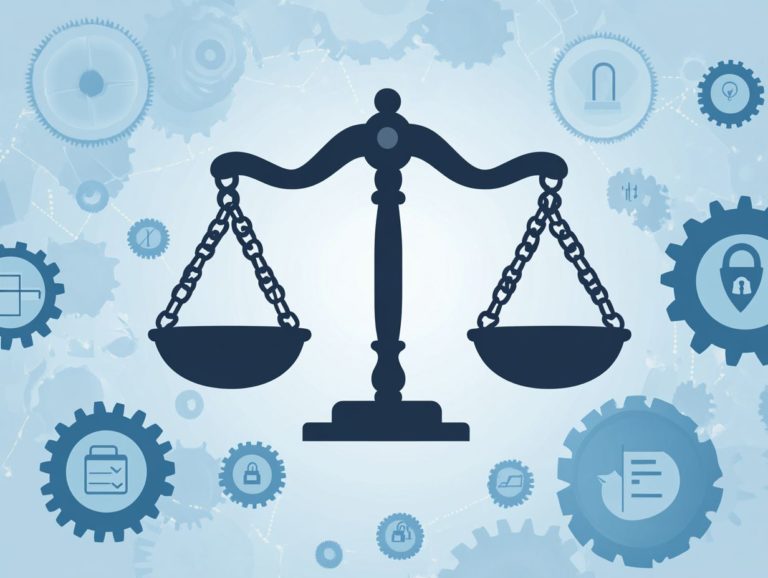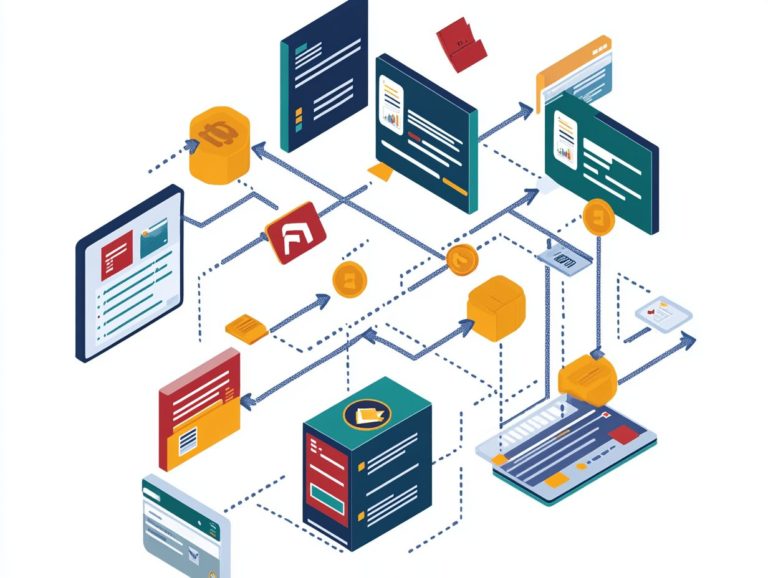the cost of non-compliance in cybersecurity
In today s digital landscape, compliance in cybersecurity isn’t merely a regulatory box to tick; it s essential for safeguarding both your business and your customers.
Grasping what compliance truly entails and understanding its significance is the first step toward protecting your organization from financial penalties, reputational damage, and legal troubles.
This article delves into common risks linked to non-compliance, effective strategies for ensuring adherence, and the long-term benefits of a strong compliance framework.
Dive in to uncover how prioritizing compliance can elevate your cybersecurity posture and ultimately lead to substantial cost savings.
Contents
- Key Takeaways:
- Understanding Compliance in Cybersecurity
- The Consequences of Non-Compliance
- Common Non-Compliance Risks in Cybersecurity
- How to Ensure Compliance in Cybersecurity
- The Cost-Effectiveness of Compliance
- Frequently Asked Questions
- What is the cost of non-compliance in cybersecurity?
- What are some financial consequences of non-compliance in cybersecurity?
- How can non-compliance in cybersecurity impact a company’s reputation?
- What legal consequences can a company face for non-compliance in cybersecurity?
- How can non-compliance in cybersecurity affect a company’s operations?
- What steps can a company take to avoid the cost of non-compliance in cybersecurity?
Key Takeaways:

Non-compliance in cybersecurity can result in serious financial penalties, reputational damage, and legal consequences.
Common non-compliance risks include failing to meet industry standards and insufficient data protection measures.
Investing in compliance measures may seem costly in the short term, but these investments can lead to long-term savings and benefits in protecting your company’s assets and reputation.
Understanding Compliance in Cybersecurity
Compliance in cybersecurity is crucial for businesses today, especially in the Payment Card Industry (PCI). These businesses must follow the Payment Card Industry Data Security Standard (PCI-DSS) to protect customer data.
Compliance extends beyond just a checklist of security standards; it also requires implementing technology solutions that address business compliance needs and mitigate risks linked to data breaches and potential penalties for non-compliance.
What is Compliance and Why is it Important?
Compliance means sticking to established guidelines and regulations designed to enhance data security, particularly within the Payment Card Industry. PCI-DSS serves as a framework to protect customer data and preserve customer trust.
This framework not only sets the stage for secure transactions but also acts as a benchmark for organizations to foster a culture of security awareness and responsibility.
For your business, being PCI-DSS compliant is vital. Non-compliance can lead to hefty fines, reputational harm, and a loss of customer loyalty.
The significance of compliance goes beyond meeting legal obligations; it cultivates a sense of accountability and transparency that resonates deeply with consumers.
When customers feel confident that their personal data is thoroughly protected, it boosts their trust. This trust often translates into long-term loyalty and positive word-of-mouth assets that are priceless in today s competitive landscape.
The Consequences of Non-Compliance
Ignoring established cybersecurity standards exposes you to serious repercussions. These can include hefty financial penalties, legal troubles, and significant reputational damage.
For businesses that overlook compliance requirements, the hidden costs can be staggering. Think about the expenses tied to forensic investigations after a data breach these can amplify the financial fallout from failing to comply.
Prioritizing adherence to these standards is not just good practice; it’s essential to safeguarding your business s future.
Financial Penalties
Financial penalties for non-compliance can be significant, especially for businesses operating within the Payment Card Industry. Card brands and acquiring banks impose fines that can dramatically increase the costs associated with non-compliance.
Imagine facing fines that range from thousands to millions of dollars because of data security breaches. Visa and MasterCard may impose fines starting at approximately $5,000 for minor infractions, but these fines can escalate considerably based on the severity and frequency of violations.
Beyond immediate financial repercussions, the long-term implications for your business can be severe. This includes heightened operational expenses as you implement compliance measures, potential revenue losses stemming from reputational damage, and the risk of being categorized as a high-risk merchant, leading to higher processing fees.
The cumulative effects of these penalties can strain your financial health, making compliance not merely a regulatory obligation but an essential component of your business’s sustainability.
Reputational Damage

Reputational damage is one of the most crippling consequences of non-compliance. When businesses face data breaches or fail to meet compliance requirements, customers swiftly lose trust.
The effects can be severe. They often lead to lost customer loyalty and reduced sales.
Take Target, for example. After the massive data breach in 2013 that compromised millions of credit card accounts, the fallout was profound. This incident didn t just bring legal and financial repercussions; it also created a climate of distrust among consumers who began to question the safety of their personal information.
Similarly, Equifax’s 2017 breach exposed sensitive data of around 147 million people, resulting in a sharp decline in customer confidence and long-term reputational damage.
These examples underscore how crucial compliance is to maintaining a positive brand image in today’s digital landscape.
Legal Consequences
Legal consequences of non-compliance can lead to severe penalties, including lawsuits and regulatory actions. Businesses face severe penalties when they ignore compliance frameworks like the General Data Protection Regulation (GDPR) and the California Consumer Privacy Act (CCPA), both of which impose strict requirements on handling customer data.
If you fail to adhere to these regulations, you could face substantial fines up to 4% of your annual global turnover under the GDPR. The CCPA is equally unforgiving, allowing for damages in the event of data breaches.
The challenges extend beyond fines; you may also deal with a loss of customer trust and reputational damage, both of which can be crippling in today s competitive landscape.
Legal ramifications can include mandatory audits, potential criminal charges for egregious violations, and even restrictions on your business operations.
Don t wait until it’s too late understand compliance laws now to protect your business.
Common Non-Compliance Risks in Cybersecurity
Common non-compliance risks in cybersecurity often arise from insufficient adherence to established security standards, such as the Payment Card Industry Data Security Standard (PCI-DSS).
This lack of compliance can lead to inadequate data protection measures, leaving your business exposed to potential data breaches and their disruptions.
Failure to Meet Industry Standards
Failing to meet established industry standards, particularly PCI-DSS, poses significant risks for businesses handling sensitive customer data. This oversight can lead to severe implications for data security.
Non-compliance opens the door to data breaches that compromise customer information, potentially resulting in big financial losses and a loss of consumer trust.
By neglecting these crucial standards, you expose your business to unauthorized access, putting sensitive data at risk of theft or exploitation. Regulatory bodies impose hefty fines that can weigh heavily on your operations.
The consequences extend beyond penalties; a damaged reputation can stifle future business opportunities and partnerships, impacting your bottom line. Prioritizing compliance is not just a safeguard it’s a strategic move for sustainable success.
Insufficient Data Protection Measures
Insufficient data protection measures are a critical factor in non-compliance that could leave your business vulnerable to data breaches and unable to meet security standards necessary to protect customer information. This vulnerability endangers sensitive data and could erode customer trust and loyalty.
As you increasingly rely on digital platforms, implementing robust security protocols is essential. Consider using encryption, firewalls, and regular audits to build strong protection against attacks.
Adopting compliance frameworks such as GDPR and HIPAA can provide you with a roadmap for developing comprehensive strategies.
By leveraging advanced technology solutions like AI-driven threat detection and secure cloud storage, you can enhance your data protection efforts, safeguarding critical assets and ensuring compliance with regulatory requirements.
How to Ensure Compliance in Cybersecurity

Ensuring compliance in cybersecurity demands a thorough approach that blends best practices with technology solutions tailored to meet security standards.
This strategic alignment protects customer data and significantly reduces the risks linked to non-compliance.
Best Practices and Strategies
Implementing best practices and strategies in cybersecurity is crucial for businesses like yours that aim to comply with established security standards.
By adopting a proactive approach, you safeguard sensitive data and address all regulatory requirements.
Consider utilizing advanced technology solutions, such as automated compliance management systems and Security Information and Event Management (SIEM) tools. SIEM tools help monitor security alerts in real time.
These solutions streamline your processes, provide real-time monitoring, and generate reports demonstrating your adherence to various regulations.
Integrating employee training programs and risk assessment frameworks into your compliance strategy strengthens your overall security posture, making it easier to navigate regulatory demands.
The Cost-Effectiveness of Compliance
The cost-effectiveness of compliance is often undervalued, but investing in it saves you money and protects your business now and in the future.
By prioritizing compliance, you can reduce potential financial losses and disruptions to your operations.
Long-Term Savings and Benefits
Long-term savings from your compliance investments go beyond just the financial aspect. They positively influence customer trust, enhance data security, and ensure robust business compliance.
Effective compliance strategies cultivate stronger relationships with your customers, fostering confidence in how their data is managed.
This ultimately leads to increased loyalty and encourages repeat business.
Strong data security measures do more than protect sensitive information; they also reduce risks associated with potential breaches, safeguarding your company’s reputation.
As you navigate evolving regulatory landscapes, investing in compliance becomes essential for staying adaptable and compliant over time, improving your standing in a competitive marketplace.
Frequently Asked Questions
What is the cost of non-compliance in cybersecurity?

The cost of non-compliance in cybersecurity refers to the financial, reputational, and legal consequences organizations face for failing to comply with industry regulations and best practices for securing sensitive data, highlighting the impact of non-compliance in cybersecurity.
What are some financial consequences of non-compliance in cybersecurity?
Non-compliance in cybersecurity can lead to financial losses due to data breaches, lawsuits, regulatory fines, and lost business opportunities. The average cost of a data breach is $3.86 million, and non-compliance can increase this amount significantly.
How can non-compliance in cybersecurity impact a company’s reputation?
Non-compliance in cybersecurity can severely damage a company’s reputation. Consumers may lose trust in the company’s ability to protect their data, leading to customer loss and negative publicity. This can have long-term effects on the company’s bottom line.
What legal consequences can a company face for non-compliance in cybersecurity?
A company can face legal consequences for non-compliance in cybersecurity, including fines from regulatory agencies, lawsuits from affected individuals, and even criminal charges depending on the severity of the non-compliance and the resulting data breach.
How can non-compliance in cybersecurity affect a company’s operations?
Non-compliance can disrupt a company’s operations and cause significant downtime, leading to productivity and revenue loss. It can also result in the loss of critical data, affecting the company’s ability to function effectively.
Take Action Now! Assess your compliance measures to protect your business and enhance customer trust.
What steps can a company take to avoid the cost of non-compliance in cybersecurity?
To avoid the cost of non-compliance in cybersecurity, companies should regularly review and update their security policies and procedures.
Train employees on cybersecurity best practices and check for potential risks regularly.
Stay informed about industry regulations these are rules that protect data privacy and security to prevent penalties and legal issues.
By actively updating your security practices, you can protect your company from costly penalties and keep your data safe!






